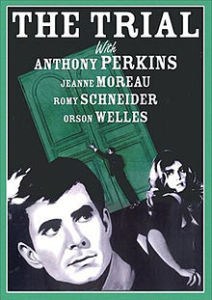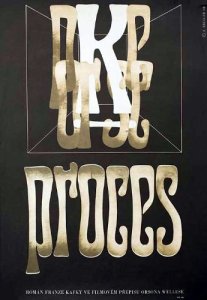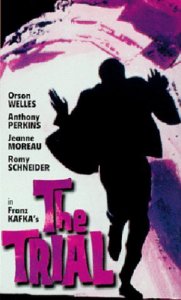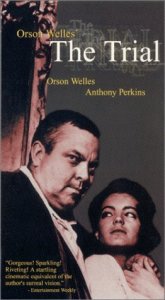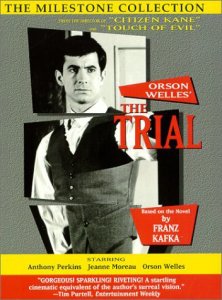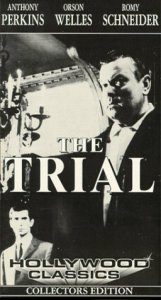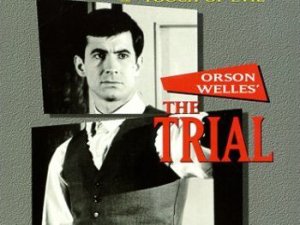The Trial ****½ (1962, Anthony Perkins, Jeanne Moreau, Romy Schneider, Orson Welles, Elsa Martinelli) – Classic Movie Review 2141
Writer-director Orson Welles’s 1962 movie version of Franz Kafka’s novel about a man caught in a Kafkaesque bureaucratic red-tape legal nightmare is compelling, engrossing and spectacularly imaginative. Welles said with his usual modesty: ‘The Trial is the best film I have ever made.’
Welles planned to shoot the main interior shots of his film at the Bois de Boulogne studios in Paris. But, when finance fell through, Welles turned defeat into victory by cleverly taking advantage of the chance to use the cavernous interior of the disused, deserted and spooky Paris train station the Gare d’Orsay as the chief setting for his film about a bewildered everyman hero arrested and tried for a crime that neither the police nor the court will explain to him.
It starts when unassuming office worker bureaucrat Josef K wakes up in his room one morning to find the police, who tell him he is on trial but not what he is accused of. He is arrested and stands trial, but he is never made aware of his charges. Without knowing the accusation, how can he protest his innocence?
The Trial begins with Welles narrating Kafka’s parable Before the Law to pinscreen scenes created by the artist Alexandre Alexeieff. The film then overflows with other typically brio Welles visual touches, using his trademark unique angles and depth of focus. It has got a great sense of style, and Welles revels in it.
But perhaps it relies most for its success on the persuasive performances from an exactly right Anthony Perkins as the haunted hero Joseph K, plus Jeanne Moreau, Romy Schneider and Elsa Martinelli as women who become involved in various ways in Josef’s trial and life, as well as Akim Tamiroff, Madeleine Robinson and Suzanne Flon. Giving a notable performance in his comfort zone, Welles himself plays the Advocate Hastler, Josef’s lawyer and the film’s principal antagonist, which he took on after Jackie Gleason rejected the part.
If a slight sense of artistic confusion and disconnect hangs over the film due to the long, complicated story of its filming and editing, it turns out that it is exactly only appropriate to the dystopian nightmarish vision that Kafka and Welles are conjuring up. Surrealistic, full of heightened weird atmosphere and at the same time horribly convincing, The Trial is delivered with all the brio expected of Welles. Edmond Richard’s startling cinematography and Jean Mandaroux’s creative production designs bring exactly the right jagged edge look for the visuals, underscored by Jean Ledrut’s music.
Welles took six months to write his screenplay, rearranging the order of Kafka’s chapters. Welles’s son had suggested that he should adapt The Trial as a stage play. In 1960, producer Alexander Salkind invited Welles to make a film from a public domain literary choice, offering him total artistic freedom, so they agreed on The Trial, only to discover later the text was not in the public domain.
Unable to film The Trial in Kafka’s home city of Prague, as his work was banned by the communist government in Czechoslovakia, Welles began the production in Yugoslavia. A set for Josef K’s workplace was made in an exposition hall outside Zagreb, Croatia, where 850 secretaries worked at typewriters at their office desks. Other sequences were later shot in Dubrovnik, Rome (Palazzo di Giustizia, headquarters Ministry of the Navy), Milan and Paris.
The film was not completed in time to premiere at the Venice Film Festival in September 1962, as planned, and was ironically replaced by West Side Story! Welles continued to edit the film up until its December 1962 premiere in Paris. It opened in the US in 1963. The reviews were mixed, but some people just didn’t get The Trial, and still don’t.
Is it an ‘agonising experience’ or an ‘astonishing work’? What critic would like to be judged calling this ‘a dead thing, like some tablet found among the dust of forgotten men’? It was Welles’s 1970 biographer Charles Higham and of course Welles was still alive to read it.
Perkins said Welles told him he saw The Trial as a black comedy and that his greatest professional pride was in being the star of a Welles-directed movie.
The running time is
May 6 2015 is the centenary of Welles’s birth.
In 2000, a restored version based on the long-lost original 35mm negative was released on DVD by Milestone Films. In 2012, a remastered high definition version was released on Blu-ray by Studio Canal.
It is remade as The Trial in a respectable Harold Pinter-scripted 1993 film by director David Jones, with Kyle MacLachlan, Anthony Hopkins and Jason Robards.
© Derek Winnert 2015 Classic Movie Review 2141
Check out more reviews on http://derekwinnert.com/

